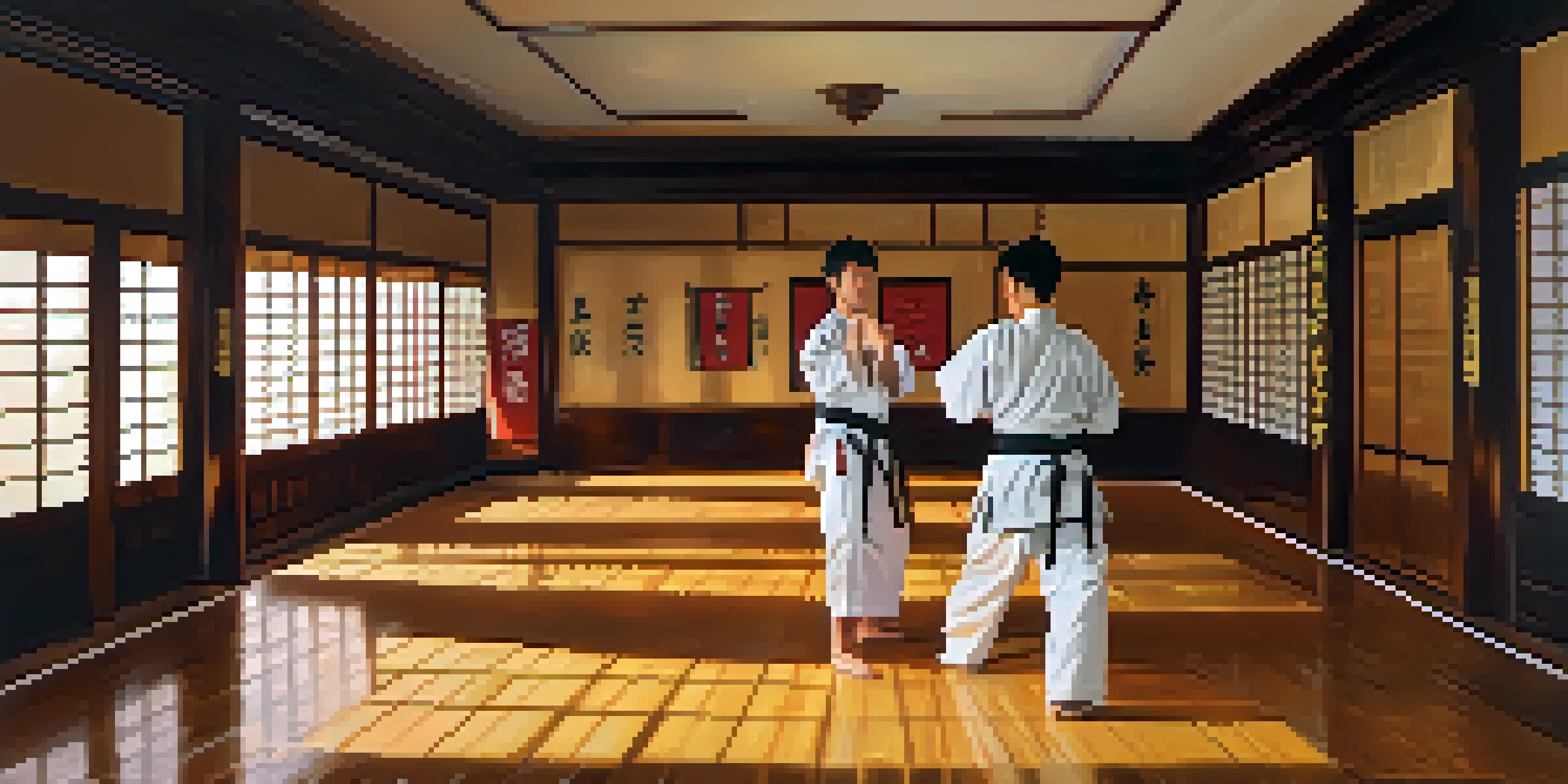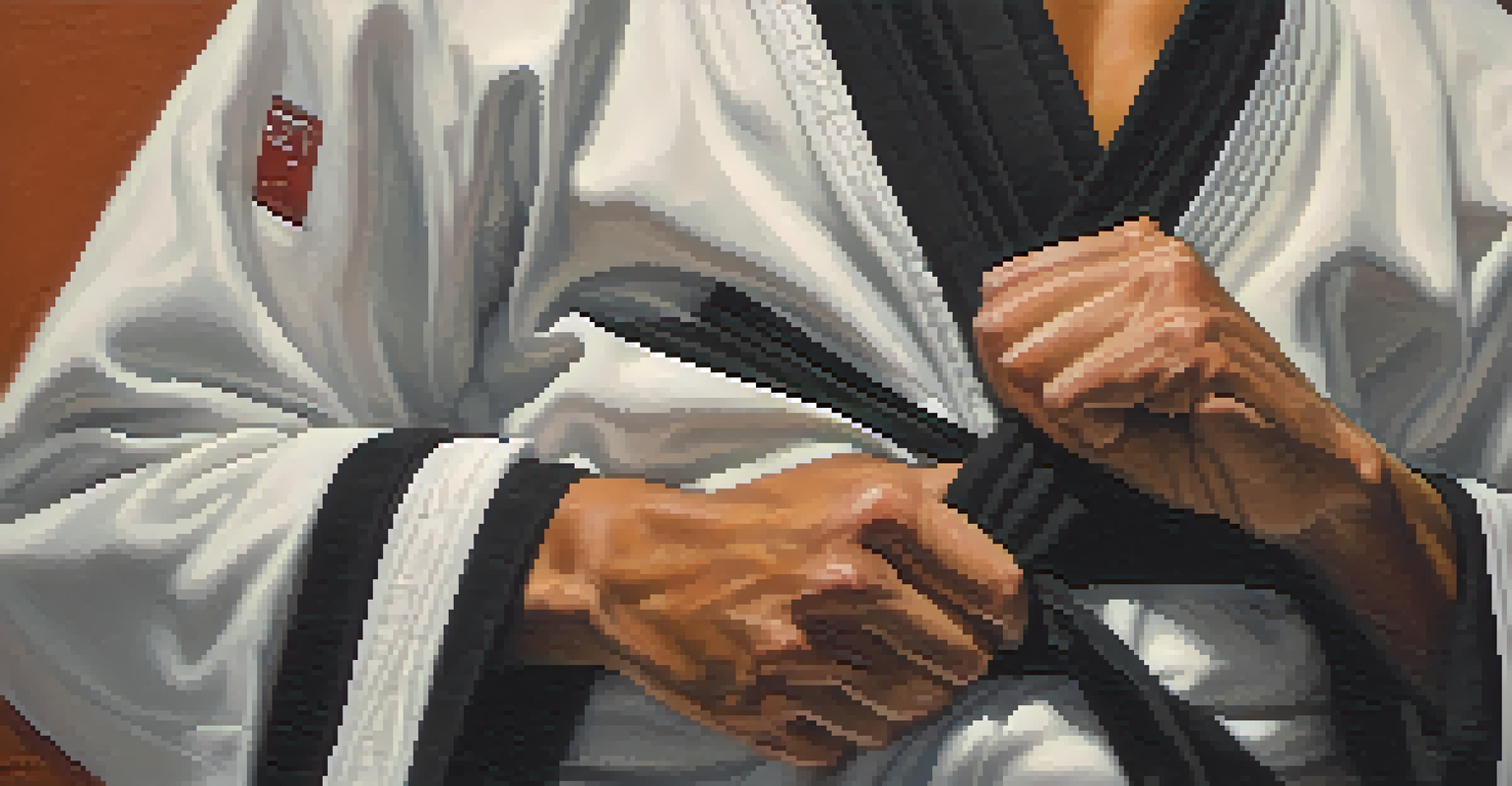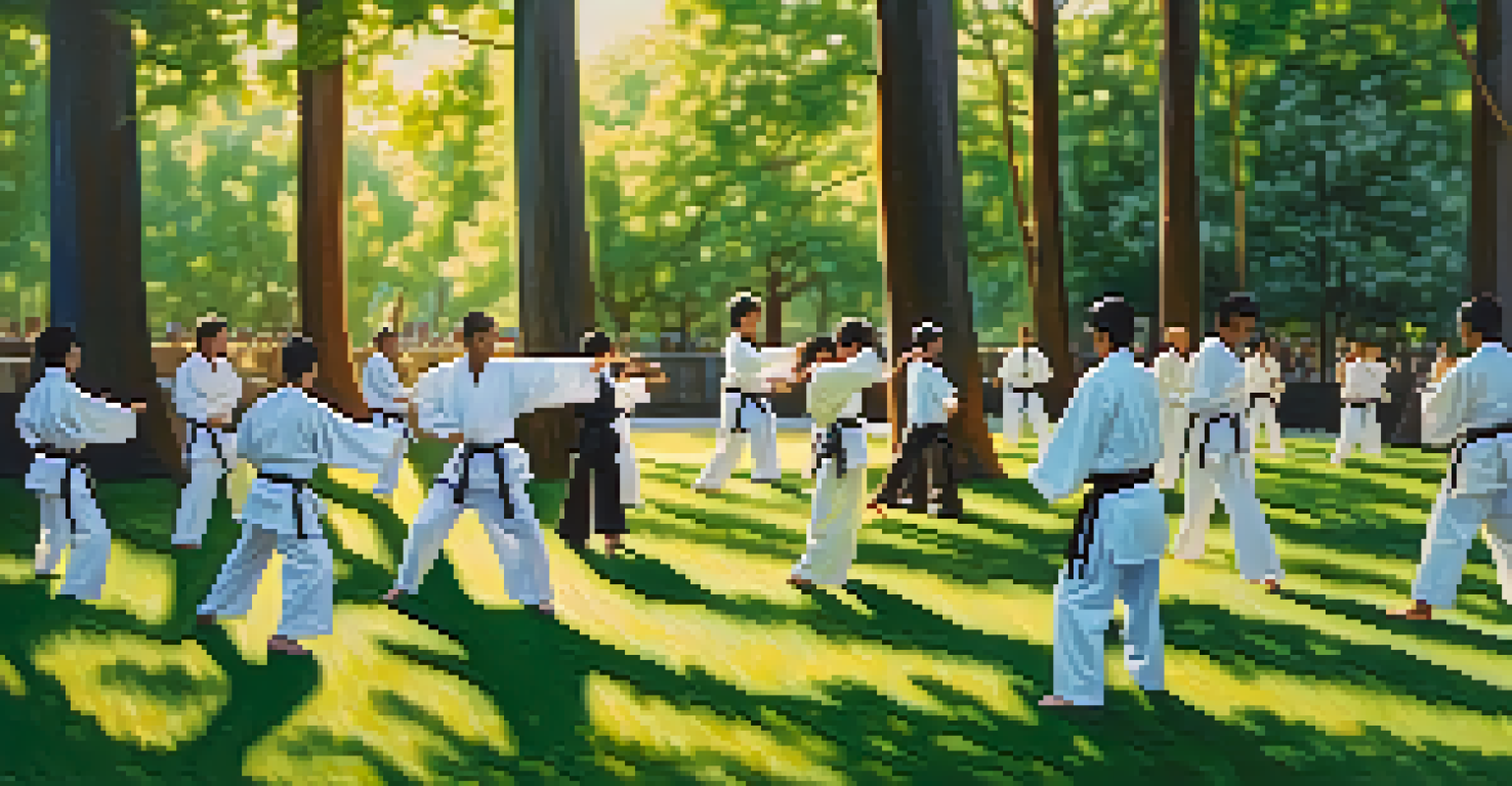The Role of Discipline in Martial Arts and Identity Formation

Understanding Discipline: The Heart of Martial Arts Practice
Discipline in martial arts goes beyond just following rules; it's a mindset that fosters self-control and focus. Practitioners learn to adhere to a structured training regimen, which helps them build resilience in both their physical and mental states. This commitment to discipline can be likened to planting a seed; with consistent care and attention, it grows into something strong and beautiful.
Discipline is the bridge between goals and accomplishment.
As martial artists progress through their training, they learn that discipline is not just about obedience to instructors, but also about setting personal goals and striving to achieve them. This journey cultivates a sense of accountability, making each practitioner more responsible for their actions and decisions. Over time, this self-directed approach becomes a cornerstone of their identity.
In essence, discipline acts as a guiding principle that shapes not only martial skills but also personal character. It's a foundation on which practitioners build their identities, learning valuable life lessons that extend far beyond the dojo. This holistic development is what makes martial arts a transformative experience.
The Connection Between Discipline and Identity Formation
When individuals commit to martial arts, they often find that the discipline they cultivate influences their sense of self. The practice requires consistent effort, which fosters a strong work ethic and a belief in one’s abilities. As they push through challenges, trainees discover who they truly are, building a robust identity rooted in perseverance and strength.

This transformation is not instantaneous; it unfolds over time through practice and reflection. Each belt earned represents not just a skill level but also a milestone in personal growth. This progress reinforces a positive self-image and helps martial artists understand their unique place in the world, highlighting the deep connection between discipline and identity.
Discipline Shapes Personal Identity
Martial arts discipline fosters self-awareness and resilience, significantly influencing practitioners' sense of self.
Furthermore, the shared experiences within a martial arts community strengthen this bond. Practitioners support each other, creating an environment where everyone feels valued and respected. This sense of belonging further solidifies their identities, showing that discipline in martial arts is as much about personal growth as it is about community.
Discipline as a Tool for Overcoming Life's Challenges
Martial arts training is packed with challenges, from mastering techniques to enduring rigorous workouts. Each hurdle teaches practitioners the importance of resilience and commitment. This lesson extends into everyday life, where the discipline gained from training can help them tackle personal and professional challenges with a newfound confidence.
The more you sweat in training, the less you bleed in battle.
Imagine a student struggling with a difficult technique; through perseverance, they eventually master it. This journey mirrors life’s ups and downs, where discipline equips them with the tools to face adversity head-on. Over time, these experiences shape their identity, reinforcing the idea that they can overcome obstacles through hard work and dedication.
Moreover, the discipline learned in martial arts encourages a proactive approach to challenges rather than a reactive one. Practitioners are empowered to take charge of their decisions and responses, fostering a mindset that embraces growth and change. This ability to navigate life’s complexities is a significant aspect of their evolving identity.
Building Confidence Through Discipline in Martial Arts
A key benefit of discipline in martial arts is the boost in self-confidence it provides. As practitioners hone their skills through rigorous training, they develop a belief in their capabilities. This newfound confidence often spills over into other areas of their lives, influencing personal relationships and professional endeavors.
Consider a martial artist who initially struggles with self-doubt. Through consistent training and the discipline to improve, they gradually become more self-assured, both on and off the mat. This transformation showcases how discipline can redefine a person’s self-image, leading them to embrace challenges rather than shy away from them.
Confidence Grows Through Training
Regular practice in martial arts builds self-confidence, empowering individuals to tackle challenges in various aspects of life.
Confidence, born from discipline, creates a ripple effect. As practitioners gain assurance in their abilities, they are more likely to take risks, speak up, and assert themselves in various situations. This evolution not only enriches their identity but also inspires those around them to pursue their own paths of growth.
Cultivating Respect and Humility Through Discipline
Discipline in martial arts is deeply intertwined with the values of respect and humility. Practitioners learn to respect their instructors, peers, and even opponents, recognizing that everyone contributes to their journey. This respect fosters a sense of community and shared growth, which is essential for personal development.
Moreover, humility is a natural byproduct of rigorous training. As martial artists encounter their limitations, they learn the value of being grounded and open to learning from others. This balance of confidence and humility shapes a well-rounded identity, allowing practitioners to appreciate both their strengths and areas for improvement.
In this way, discipline nurtures qualities that extend beyond the dojo. Practitioners carry respect and humility into their everyday lives, influencing how they interact with others. This broader application of martial arts values reinforces their identity as compassionate and respectful individuals.
The Lifelong Journey of Discipline in Martial Arts
Embarking on a martial arts journey is not just about achieving a black belt; it's about embracing a lifelong commitment to discipline and growth. Practitioners often find that the lessons learned extend far beyond the training floor, becoming integral to their everyday lives. This ongoing journey reflects their evolving identity, shaped by years of dedication and practice.
As individuals progress through various stages of their martial arts journey, they continually redefine their goals and aspirations. Each new challenge presents an opportunity for growth, prompting them to adapt and evolve. This adaptability is a hallmark of a disciplined practitioner, illustrating how martial arts fosters resilience.
Respect and Humility are Key Values
Discipline in martial arts instills respect and humility, nurturing a supportive community and personal growth.
Ultimately, the lifelong journey of discipline in martial arts is about embracing change and nurturing a growth mindset. It teaches practitioners to view life as an ongoing process of learning and self-discovery. This perspective not only enriches their identities but also empowers them to face life’s uncertainties with confidence and grace.
Conclusion: The Lasting Impact of Discipline on Identity
In conclusion, the role of discipline in martial arts is profound, influencing not just skills but the very essence of one's identity. Through consistent training, practitioners cultivate resilience, confidence, respect, and humility, shaping their character in meaningful ways. This transformative journey highlights the interconnectedness of discipline and identity formation.
As martial artists navigate the challenges of their practice, they emerge with a stronger sense of self and a deeper understanding of their place in the world. The lessons learned extend beyond the dojo, impacting relationships and professional endeavors, making discipline a pivotal aspect of personal development.

Ultimately, the discipline ingrained through martial arts serves as a guiding principle for navigating life's complexities. It empowers practitioners to embrace growth, overcome challenges, and continuously redefine their identities in a positive light, illustrating the lasting impact of martial arts training.